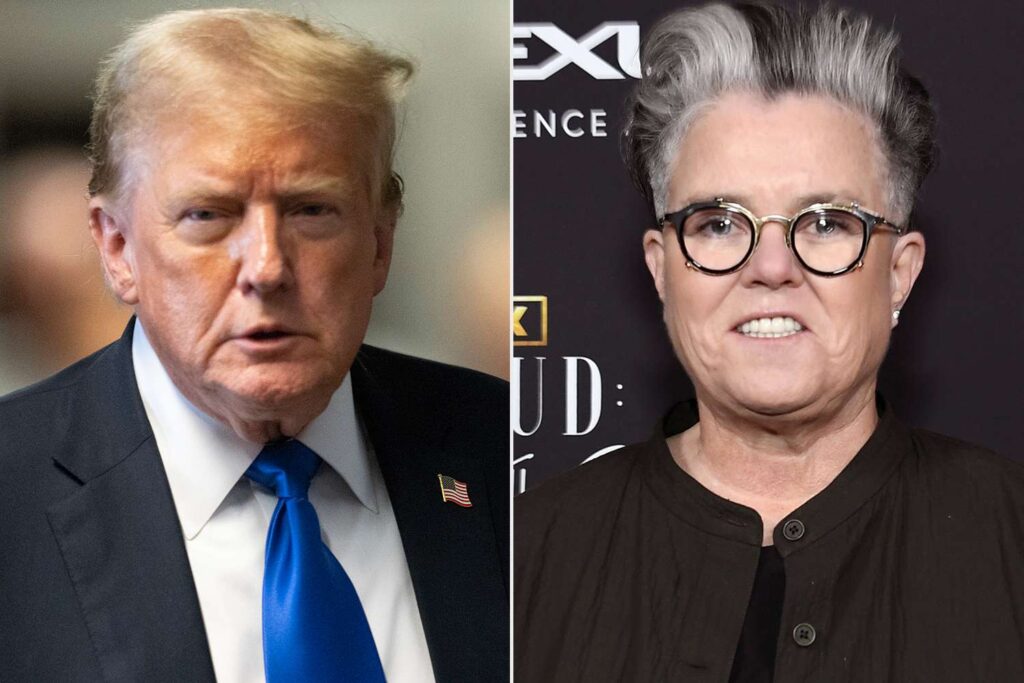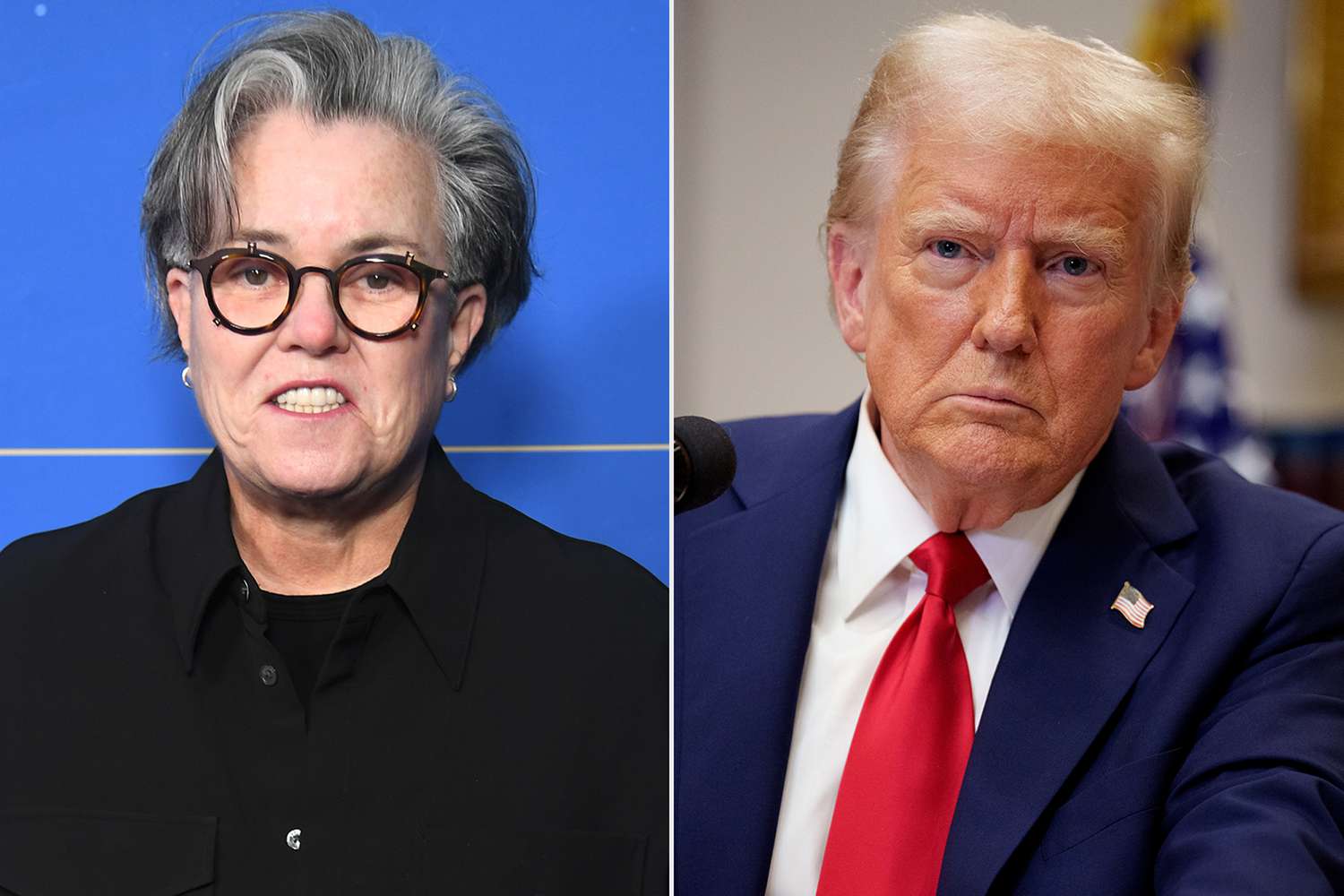In the realm of American pop culture and politics, few celebrity feuds have stood the test of time like the public clash between former President Donald Trump and comedian and actress Rosie O’Donnell. Their bitter exchanges, full of personal jabs, ideological insults, and raw emotion, have spanned nearly two decades. But this week, the animosity reached new heights when Trump, now a private citizen but still a potent political force, took to his Truth Social platform to attack O’Donnell in the most extreme terms yet.
In a shocking post made on July 12, Trump wrote:
“Because of the fact that Rosie O’Donnell is not in the best interests of our Great Country, I am giving serious consideration to taking away her Citizenship. She is a Threat to Humanity, and should remain in the wonderful Country of Ireland, if they want her. GOD BLESS AMERICA!”
The statement, outrageous in its tone and implications, triggered immediate reactions — not just from the media and the public, but from O’Donnell herself, who fired back with an impassioned and personal response on Instagram, continuing a conflict that has become symbolic of deeper divides in American political and cultural life.
This isn’t just about two famous figures trading barbs. The Trump-O’Donnell feud offers a lens into the changing nature of celebrity, power, dissent, and what it means to be American in a politically fractured era.
To understand the significance of this latest flare-up, we must rewind to the mid-2000s. At the time, Trump was best known as a bombastic real estate mogul and host of The Apprentice, while Rosie O’Donnell had just joined the panel of The View. Their feud ignited in 2006 when O’Donnell criticized Trump on-air for his handling of a Miss USA scandal, mocking his moral authority and calling him a “snake-oil salesman.”
Trump responded with brutal and highly personal attacks, going after O’Donnell’s appearance, career, and personal life — including her sexuality. He called her a “loser” and a “slob” in interviews and on television. O’Donnell, never one to back down, retaliated with equal fervor, labeling Trump a misogynist and bully. The media ate it up, and for years their conflict simmered, occasionally reigniting when one or the other made headlines.
But in 2016, their feud took on a new dimension. When Trump ran for president, he brought up Rosie during a Republican primary debate, stating matter-of-factly that “the only person I called a pig was Rosie O’Donnell.” The comment drew laughter from some in the audience, but also reinforced his pattern of targeting women in deeply personal ways.
From that moment forward, their rivalry transformed into something symbolic — a microcosm of the cultural and political divisions tearing at the seams of American discourse. On one side: Trump, with his populist bravado, hyper-masculinity, and relentless self-promotion. On the other: O’Donnell, outspoken, liberal, queer, and deeply opposed to what Trump represents.

In early 2025, Rosie O’Donnell made a major life change. On January 15, she officially moved to Ireland — a decision she said was prompted by the emotional toll of the political climate in the U.S. after years of Trump’s influence.
“It’s been heartbreaking to see what’s happening politically and hard for me personally as well,” she explained to her fans in a social media post. “The personal is political, as we all know.”
Living abroad has, according to O’Donnell, improved her mental and emotional well-being. In a March TikTok video, she told fans that she was “sleeping better” and felt “healthier” without the anxiety and stress of being in a country she felt was moving in a direction antithetical to her values.
For O’Donnell, Ireland offered something the U.S. no longer did: a sense of peace, decency, and safety — especially for her and her autistic child. “You build walls,” she said, directly addressing Trump in her recent Instagram post. “I build a life for my autistic kid in a country where decency still exists.”
So what triggered Trump’s latest outburst?
Though it’s impossible to know for certain, O’Donnell has a theory. In her Instagram response, she posted a photo of Trump with convicted pedophile Jeffrey Epstein, accompanied by the caption: “Rattled again? Eighteen years later and I still live rent-free in that collapsing brain of yours.”
Trump’s connection to Epstein — a man who died in 2019 under mysterious circumstances while awaiting trial on sex trafficking charges — remains controversial and the subject of countless conspiracy theories. O’Donnell seemed to be suggesting that the image might’ve hit a nerve, or that simply her continued visibility and activism are enough to provoke Trump’s ire.
His statement about revoking her citizenship — though legally toothless — was nonetheless chilling. In the United States, the government cannot revoke citizenship as punishment for speech or dissent, especially not for natural-born citizens like O’Donnell. Yet, the very idea that a former president would propose such a move raised alarm bells for civil libertarians and political observers.
“It’s not just a petty feud anymore,” one political analyst noted. “When a former president calls for revoking someone’s citizenship over political disagreement, it echoes the behavior of autocrats, not leaders of democratic societies.”
Rosie’s reply to Trump’s latest volley was nothing short of poetic. Her Instagram caption read more like a modern resistance manifesto than a typical celebrity clapback. Structured in short, punchy lines, her words were part protest, part personal testimony.
“You call me a threat to humanity –
but I’m everything you fear:
a loud woman
a queer woman
a mother who tells the truth
an American who got out of the country b4 u set it ablaze…”
She continued with a powerful juxtaposition of values. While Trump, in her view, “sells fear on golf courses,” she is someone who “makes art about surviving trauma.” He “lies, steals, degrades,” while she “nurtures, creates, and persists.”
Her message was deeply rooted in identity — as a woman, a mother, a queer person, and an artist — and in sharp opposition to the hyper-masculine, fear-based rhetoric she believes Trump thrives on.
“You crave loyalty –
I teach my children to question power.”
The response was received with praise from her followers and fellow celebrities, many of whom commented with messages of support, solidarity, and admiration for her courage and clarity.
While many may see the Trump-O’Donnell feud as another spectacle in America’s culture war circus, there’s a more serious undercurrent to the story. Trump’s continued targeting of opponents — from journalists to political rivals to celebrities — plays into an authoritarian pattern of discrediting and dehumanizing dissent.

O’Donnell, by moving to Ireland and speaking openly about her mental health, her fears, and her family, has flipped the script. Rather than retreat into silence, she’s chosen to engage in artistic and personal activism, sharing her story in a way that resonates with many who feel alienated by today’s political climate.
“Silencing me won’t work,” she seemed to say. “Because I was never yours to control.”
In many ways, this renewed clash between Trump and O’Donnell is more than just a personal vendetta. It’s emblematic of the broader tension between two visions of America: one rooted in exclusionary nationalism, authoritarianism, and traditional power structures; the other, grounded in progressive ideals, inclusivity, resistance, and personal freedom.
For Trump supporters, O’Donnell may indeed represent everything they disdain — Hollywood liberalism, LGBTQ+ advocacy, outspoken women. For O’Donnell’s fans and many progressives, she is a symbol of fearless resistance against bullying and toxic power.
What’s undeniable is that their feud isn’t just about hurt feelings or social media posts. It’s a cultural and ideological clash that mirrors America’s fractured identity in the 21st century.
Whether or not Trump continues to target O’Donnell remains to be seen. As the 2024 election cycle fades and Trump eyes his political future, his public statements continue to draw scrutiny for their tone, their legality, and their broader implications.
As for O’Donnell, she appears to be thriving in her new life abroad. She’s active on social media, sharing updates about her life, her art, and her advocacy. In leaving the U.S., she hasn’t surrendered her citizenship — legal or symbolic. Instead, she’s found a new way to speak truth to power from afar.
And if Trump thought physical distance would silence her, he was clearly mistaken.
“Go ahead and try, King Joffrey with a tangerine spray tan,” she taunted. “I’m not yours to silence. I never was.”
In a world increasingly polarized, their ongoing conflict may be a reminder that battles over identity, power, and truth are far from over — and sometimes, the loudest voices of dissent come not from the podium, but from artists, mothers, and comedians who simply refuse to back down.



